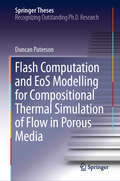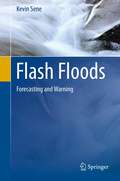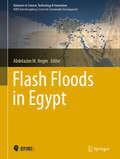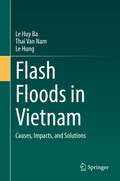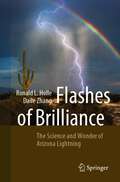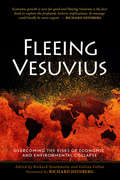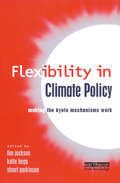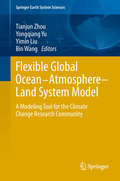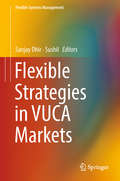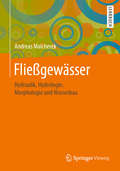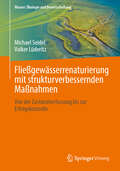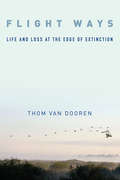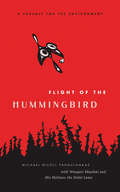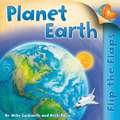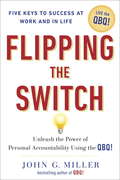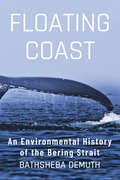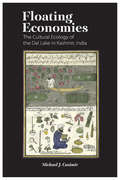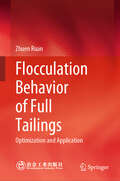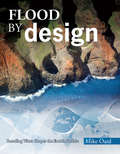- Table View
- List View
Flash Computation and EoS Modelling for Compositional Thermal Simulation of Flow in Porous Media (Springer Theses)
by Duncan PatersonThis book investigates a wide range of phase equilibrium modelling and calculation problems for compositional thermal simulation. Further, it provides an effective solution for multiphase isenthalpic flash under the classical framework, and it also presents a new flash calculation framework for multiphase systems, which can handle phase equilibrium and chemical reaction equilibrium simultaneously. The framework is particularly suitable for systems with many phases and reactions. In this book, the author shows how the new framework can be generalised for different flash specifications and different independent variables. Since the flash calculation is at the heart of various types of compositional simulation, the findings presented here will promote the combination of phase equilibrium and chemical equilibrium calculations in future simulators, aiming at improving their robustness and efficiency.
Flash Floods
by Kevin SeneFlash floods typically develop in a period a few hours or less and can arise from heavy rainfall and other causes, such as dam or flood defence breaches, and ice jam breaks. The rapid development, often associated with a high debris content, can present a considerable risk to people and property. This book describes recent developments in techniques for monitoring and forecasting the development of flash floods, and providing flood warnings. Topics which are discussed include rainfall and river monitoring, nowcasting, Numerical Weather Prediction, rainfall-runoff modelling, and approaches to the dissemination of flood warnings and provision of an emergency response. The book is potentially useful on civil engineering, water resources, meteorology and hydrology courses (and for post graduate studies) but is primarily intended as a review of the topic for a wider audience.
Flash Floods in Egypt (Advances in Science, Technology & Innovation)
by Abdelazim M. NegmThis book presents the latest findings and information on flash floods in Egypt and presents case studies from various regions throughout the country. The quantitative and qualitative dimensions of these flash floods are discussed on the basis of statistical analysis and field observations. The book covers a broad and diverse range of topics, including evaluation of drainage basins, early warning systems, flash flood investigations, hydrologic simulation, GIS and flash floods, environmental flash floods, hazard management, flash flood monitoring, assessment of flood risks, flash flood vulnerability and mitigation, management of flash floods, prediction and mitigation, and rainfall harvesting and utilization. The book offers a unique source of information on virtually all dimensions of flash floods in Egypt and their environmental impacts, and combines analysis, observations, and experts’ hands-on field experience. It also supports the assessment and management of flash floods in Egypt, a country currently facing many challenges in implementing sustainable development plans, mainly because of the severe water scarcity the arid country facing.
Flash Floods in Vietnam: Causes, Impacts, and Solutions
by Le Huy Ba Thai Van Nam Le HungThis book discusses the threats and impacts of flash floods in Vietnam on environmental, human, and socio-economic resources, and covers monitoring, forecasting, warning, urgent action plans, and prevention solutions. While the work focuses on cases in Vietnam, it is applicable to many regions in the world that experience flash flooding as a common occurrence. Through data collection, field surveys, and investigational statistics from a specialized group of authors, the book provides comprehensive background knowledge on flash floods, and a flash flood hazard map using remote sensing and GIS techniques that can be used to assess the likelihood and potential impacts of flash floods before vulnerable areas and populations can be threatened. The intended audience of this manuscript is people interested in the fields of weather, environment, and natural disasters. It will serve as a reference for environmental managers, administrators of disaster planning, and extreme weather scientists.
Flash, Crash, Rumble, and Roll
by Franklyn M. BranleyExplains how and why a thunderstorm occurs and gives safety steps to follow when lightning is flashing.
Flash, Crash, Rumble, and Roll (Let's-Read-and-Find-Out Science 2)
by Dr. Franklyn M. BranleyRead and find out about what causes the flash, crash, rumble, and roll of thunderstorms in this colorfully illustrated nonfiction picture book.Did you know that lightning bolts can be over a mile long? Or that they may come from clouds that are ten miles high? Storms can be scary, but not if you know what causes them. Before the next thunderstorm, grab this book by the expert science team Franklyn Branley and True Kelley and learn all about thunderstorms.This is a clear and appealing science book for early elementary age kids, both at home and in the classroom. It's a Level 2 Let's-Read-and-Find-Out, which means the book explores more challenging concepts for children in the primary grades. The 100+ titles in this leading nonfiction series are:hands-on and visualacclaimed and trustedgreat for classroomsTop 10 reasons to love LRFOs:Entertain and educate at the same timeHave appealing, child-centered topicsDevelopmentally appropriate for emerging readersFocused; answering questions instead of using survey approachEmploy engaging picture book quality illustrationsUse simple charts and graphics to improve visual literacy skillsFeature hands-on activities to engage young scientistsMeet national science education standardsWritten/illustrated by award-winning authors/illustrators & vetted by an expert in the fieldOver 130 titles in print, meeting a wide range of kids' scientific interestsBooks in this series support the Common Core Learning Standards, Next Generation Science Standards, and the Science, Technology, Engineering, and Math (STEM) standards. Let's-Read-and-Find-Out is the winner of the American Association for the Advancement of Science/Subaru Science Books & Films Prize for Outstanding Science Series.
Flashes of Brilliance: The Science and Wonder of Arizona Lightning
by Ronald L. Holle Daile ZhangThis book is a comprehensive resource on lightning and describes the unique roles which the state of Arizona has with regard to lightning. Not only is it spectacular, it is also admired, feared, and misunderstood, but its knowledge has come of age in the last two decades.This book describes why Arizona can be called the “Lightning Photography Capital of the U.S.”, how the general public and Native Americans in Arizona have viewed lightning, and when and where lightning occurs and impacts people and resources in Arizona. It contains summaries of interviews with current and former University of Arizona staff who invented real-time lightning detection in the late 1970s and how subsequent lightning research in Arizona has been globally significant. The authors are very well acquainted with and up to date on these topics. The style of this book is active and somewhat scholarly but readable by the nonprofessional with a general interest in lightning.What is lightning? How does lightning affect Arizona? Why do photographers come to Arizona for lightning photographs? What is unique about Arizona lightning? How is lightning detected in Arizona and around the world? This book tells you answers to these questions.This book is intended for a broad audience comprised of visitors, interested lay public, a variety of scientific disciplines, media, medicine, lightning safety, and fire weather. It is suitable for readers desiring a general overview of lightning, especially in Arizona, but also for those who want to know specifically about the topic.
Fleeing Vesuvius
by Richard Heinberg Richard Douthwaite Gillian FallonPractical and fundamentally optimistic, Fleeing Vesuvius takes a hard look at many of the problems facing humanity and offers far-reaching solutions. This collection of essays by 27 leading thinkers weaves together the threads of peak oil, resource depletion, economic instability, and climate change to suggest ways of coping with a future that will be materially poorer than the past.
Flexibilisierung von Arbeitswelten in der digitalen Transformation und der Covid-19-Pandemie: Eine konfigurationstheoretische Analyse der funktionalen Umsetzung von Homeoffice (Zukunftsfähige Unternehmensführung in Forschung und Praxis)
by Madlen Anna KrügerDie Flexibilisierung von Arbeitswelten stellt eine zentrale Maßnahme für Unternehmen dar, um auf neue Anforderungen der Umwelt zu reagieren. Die Umsetzung flexibler Arbeitsmodelle muss daher wissenschaftlich erforscht und auf dieser Basis in der Praxis konkret gestaltet werden. Das vorliegende Buch untersucht empirisch die erfolgreiche Umsetzung von Homeoffice vor einem konfigurationstheoretischen Hintergrund. Es wird aufgezeigt, welche Faktoren die Umsetzung von Homeoffice in Organisationen beeinflussen, welche Konfigurationen von Faktoren in der Praxis besonders erfolgreich sind, und durch welche HR-Maßnahmen das Arbeitsmodell konkret gestaltet werden kann. Die Ergebnisse knüpfen an aktuelle Forschungen zu organisationalen Konfigurationen und zu neuen Arbeitswelten an und tragen außerdem dazu bei, künftig mehr positive Potentiale von Homeoffice nutzbar zu machen. Dazu gehören momentan besonders die Aufrechterhaltung des Arbeitsbetriebes während der Pandemie, eine leichtere Einbindung aller Arbeitskräfte in das Erwerbsleben und eine fortschreitende Gleichstellung der Geschlechter sowie ein sinkendes Verkehrsaufkommen in Zeiten des Klimawandels.
Flexibility in Global Climate Policy: Beyond Joint Implementation
by Tim Jackson Stuart ParkinsonSince the adoption of the Kyoto Protocol to the United Nations Framework Convention on Climate Change in 1997, the negotiation of policy responses to climate change has become an area of major research. This authoritative volume sets out the main debates and processes of joint implementation - bilateral or multilateral investments in greenhouse gas emission reduction or sequestration - and explores the issues involved in constructing an appropriate institutional framework. It examines the key economic, environmental, social and ethical impacts, and assesses the operational design of the flexibility mechanisms of joint implementation, including emissions trading and the Clean Development Mechanism. An approach is developed in which streamlined assessment procedures are combined with institutional safeguards in order to balance the demand for practical mechanisms with the environmental objectives of the Protocol. The book provides detailed case studies of energy sector investment in Eastern European host countries.
Flexible Global Ocean-Atmosphere-Land System Model
by Bin Wang Tianjun Zhou Yongqiang Yu Yimin LiuCoupled climate system models are of central importance for climate studies. A new model known as FGOALS ( the Flexible Global Ocean-Atmosphere-Land System model), has been developed by the Sate Key Laboratory of Numerical Modeling for Atmospheric Sciences and Geophysical Fluid Dynamics, Institute of Atmospheric Physics, Chinese Academy of Sciences (LASG/IAP, CAS), a first-tier national geophysical laboratory. It serves as a powerful tool, both for deepening our understanding of fundamental mechanisms of the climate system and for making decadal prediction and scenario projections of future climate change. "Flexible Global Ocean-Atmosphere-Land System Model: A Modeling Tool for the Climate Change Research Community" is the first book to offer systematic evaluations of this model's performance. It is comprehensive in scope, covering both developmental and application-oriented aspects of this climate system model. It also provides an outlook of future development of FGOALS and offers an overview of how to employ the model. It represents a valuable reference work for researchers and professionals working within the related areas of climate variability and change. Prof. Tianjun Zhou, Yongqiang Yu, Yimin Liu and Bin Wang work at LASG, the Institute of Atmospheric Physics, Chinese Academy of Sciences, China.
Flexible Strategies in VUCA Markets (Flexible Systems Management)
by Sushil Sanjay DhirThis book discusses the concepts of volatility, uncertainty, complexity, and ambiguity (VUCA) that are the core of various paradigms used in strategic management to understand competitive advantage as well as flexibility in organizational boundaries. It serves as a valuable reference resource in the area of VUCA markets. An increase in the levels and types of uncertainty has important implications potentially for the durability of a company’s advantages, the way firms learn and adapt, approaches for managing innovation and knowledge, and the attractiveness of different strategies and organizational models. In today’s world, strategic flexibility in VUCA is essential for business leaders to sustain market advantage and attain a clear vision amid the chaos. Business leaders who stay focused and are aware of external volatility as the prevalent characteristic are successful, while those who are not flexible in this VUCA world and lock themselves into fixed positions lose out.The book includes empirical and conceptual research papers along with case studies and models discussing strategies for emerging markets in volatile and uncertain environments. It also covers a variety of issues, including innovation, people and processes, financial management, and leadership and strategies in VUCA markets. Apart from research fraternity and academia, the contents of the book will be useful for practitioners as well as industry watchers.
Fließgewässer- und Auenentwicklung: Grundlagen und Erfahrungen
by Werner Konold Peter Meyer Stephan Von Keitz Walter Binder Mario Sommerhäuser Michael Schirmer Klaus Arzet Birgit Beckers Hubertus Brückner Holger Brux Dieter Coldewey Alexandra Dehnhardt Ulrich Detering Sebastian Döbbelt-Grüne Joachim Drüke Thomas-Ols Eggers Klaus-Dieter Fröhlich Christian Göldi Josef Groß Anja Kaussow Ellen Kiel Uwe Koenzen Annette Kurth Roland Loerbroks Helmut Mader Dietmar Mehl Thomas Paulus Tanja Pottgieser Bernd Schackers Jörg Scholle Georg Schrenk Peter Sellheim Mechtild Semrau Simon Spinner Eberhard Städtler Bernd Walser Klaus Werk Michael WeyandDieses Fachbuch erläutert die Grundlagen für die Entwicklung von Fließgewässern und Gewässerauen und hilft dabei an den Erfahrungen der Autoren teilzuhaben. Aktuelle Vorgehensweisen zum Umgang mit einer dynamischen Gewässer- und Auenentwicklung werden nachvollziehbar dargestellt und durch zahlreiche Beispiele aus unterschiedlichen Gewässerlandschaften ergänzt. Zur Erreichung der ambitionierten Ziele der Europäischen Wasserrahmenrichtlinie (WRRL) sind die gewässerökologischen, naturschutzfachlichen und hydromorphologischen Bedingungen (u.a. Hoch- und Niedrigwasser) im Gewässerkörper und in den angrenzenden Bereichen (u.a. die Gewässerauen), bei der Planung und Gestaltung zu berücksichtigen. Eine ganzheitliche Betrachtungsweise ist dabei Grundvoraussetzung.
Fließgewässer: Hydraulik, Hydrologie, Morphologie und Wasserbau
by Andreas MalcherekDas vorliegende Buch vermittelt Studierenden die hydrologischen, hydraulischen und wasserbaulichen Grundlagen für Gerinne und Fließgewässer. Mit den Programmierbeispielen können die Inhalte geübt und vertieft werden.
Fließgewässerrenaturierung mit strukturverbessernden Maßnahmen: Von der Zustandserfassung bis zur Erfolgskontrolle (Wasser: Ökologie und Bewirtschaftung)
by Michael Seidel Volker LüderitzWie können strukturverbessernde Maßnahmen an Fließgewässern wirksamer umgesetzt werden? Dieses Buch zeigt die Bedeutung der Erfolgskontrolle als Grundlage der Optimierung von Revitalisierungsmaßnahmen an Fließgewässern. Sowohl etablierte als auch neu entwickelte Methoden und Verfahren sind vorgestellt. Es ist besprochen, wie der Fließgewässerzustand erfasst wird, warum Ziele realistischer und konkreter als bisher üblich zu formulieren sind und warum die Wiederherstellung von Funktionen und Prozessen so wichtig ist. Mit welchen Maßnahmen vor diesem Hintergrund vorrangig begonnen werden sollte, ist ebenso dargestellt wie die Frage, auf welche Weise der Erfolg objektiv und effizient bewertet werden kann. Insgesamt entsteht ein besseres Grundverständnis für das Thema sowie für die Wasserrahmenrichtlinie. Ziel des Buches ist, dass Maßnahmen in der Praxis geeigneter priorisiert, wirksamer geplant und umgesetzt werden können. Können Erfolge besser aufgezeigt werden, fördert dies die Akzeptanz in der Öffentlichkeit.
Flight Ways
by Thom Van DoorenA leading figure in the emerging field of extinction studies, Thom van Dooren puts philosophy into conversation with the natural sciences and his own ethnographic encounters to vivify the cultural and ethical significance of modern-day extinctions. Unlike other meditations on the subject, Flight Ways incorporates the particularities of real animals and their worlds, drawing philosophers, natural scientists, and general readers into the experience of living among and losing biodiversity.Each chapter of Flight Ways focuses on a different species or group of birds: North Pacific albatrosses, Indian vultures, an endangered colony of penguins in Australia, Hawaiian crows, and the iconic whooping cranes of North America. Written in eloquent and moving prose, the book takes stock of what is lost when a life form disappears from the world -- the wide-ranging ramifications that ripple out to implicate a number of human and more-than-human others. Van Dooren intimately explores what life is like for those who must live on the edge of extinction, balanced between life and oblivion, taking care of their young and grieving their dead. He bolsters his studies with real-life accounts from scientists and local communities at the forefront of these developments. No longer abstract entities with Latin names, these species become fully realized characters enmeshed in complex and precarious ways of life, sparking our sense of curiosity, concern, and accountability toward others in a rapidly changing world.
Flight Ways: Life and Loss at the Edge of Extinction
by Thom Van DoorenA leading figure in the emerging field of extinction studies, Thom van Dooren puts philosophy into conversation with the natural sciences and his own ethnographic encounters to vivify the cultural and ethical significance of modern-day extinctions. Unlike other meditations on the subject, Flight Ways incorporates the particularities of real animals and their worlds, drawing philosophers, natural scientists, and general readers into the experience of living among and losing biodiversity.Each chapter of Flight Ways focuses on a different species or group of birds: North Pacific albatrosses, Indian vultures, an endangered colony of penguins in Australia, Hawaiian crows, and the iconic whooping cranes of North America. Written in eloquent and moving prose, the book takes stock of what is lost when a life form disappears from the world -- the wide-ranging ramifications that ripple out to implicate a number of human and more-than-human others. Van Dooren intimately explores what life is like for those who must live on the edge of extinction, balanced between life and oblivion, taking care of their young and grieving their dead. He bolsters his studies with real-life accounts from scientists and local communities at the forefront of these developments. No longer abstract entities with Latin names, these species become fully realized characters enmeshed in complex and precarious ways of life, sparking our sense of curiosity, concern, and accountability toward others in a rapidly changing world.
Flight Ways: Life and Loss at the Edge of Extinction (Critical Perspectives on Animals: Theory, Culture, Science, and Law)
by Thom van DoorenA leading figure in the emerging field of extinction studies, Thom van Dooren puts philosophy into conversation with the natural sciences and his ethnographic encounters to vivify the cultural and ethical significance of modern-day extinctions. Unlike other meditations on the subject, Flight Ways incorporates the particularities of real animals and their worlds, drawing philosophers, natural scientists, and general readers into the experience of living among and losing biodiversity.Each chapter of Flight Ways focuses on a different species or group of birds: North Pacific albatrosses, Indian vultures, an endangered colony of penguins in Australia, Hawaiian crows, and the iconic whooping cranes of North America. Written in eloquent and moving prose, the book takes stock of what is lost when a life form disappears from the world—the wide-ranging ramifications that ripple out to implicate a number of human and more-than-human others. Van Dooren intimately explores what life is like for those who must live on the edge of extinction, balanced between life and oblivion, taking care of their young and grieving their dead. He bolsters his studies with real-life accounts from scientists and local communities at the forefront of these developments. No longer abstract entities with Latin names, these species become fully realized characters enmeshed in complex and precarious ways of life, sparking our sense of curiosity, concern, and accountability toward others in a rapidly changing world.
Flight of the Hummingbird
by Wangari Maathai The Dalai Lama Michael Nicoll YahgulanaasHummingbirds have long been a symbol of wisdom and courage. In this charming story, a hummingbird makes a valiant effort to put out a raging fire that threatens her forest home - trip after trip, her beak is filled each time with just a drop of water. Her efforts show her woodland companions that doing something - anything - is better than doing nothing at all. The hummingbird parable, which originates with the Quechuan people of South America, has become a talisman for environmentalists and activists worldwide committed to making meaningful change. This retelling, enlivened by Michael Nicoll Yahgulanaas' fabulous Haida-manga illustrations, is suitable for all ages of would-be activists. Although environmental responsibility often seems like an overwhelming task, The Flight of the Hummingbird shows how easy it is to start and how great the effect could be if everyone just did what they could.
Flip The Flaps: Planet Earth
by Mike Goldsmith Nicki PalinInFlip The Flaps: Planet Earth by Dr Mike Goldsmith, illustrated by Nicki Palin, children zoom up through protective layers of the atmosphere from the surface to outer space, following the Earth as it makes its yearly journey around the Sun. Young explorers lift the flaps to reveal answers about everything from the inner workings of our planet and why volcanoes erupt to finding animals in the forests and in the sea. Plus, a fun spot-the-difference game suddenly appears as the artwork amazingly changes.
Flipping the Switch...: Unleash the Power of Personal Accountability Using the QBQ!
by John G. MillerIn his bestselling book QBQ! The Question Behind the Question, John G. Miller revealed how personal accountability helps to create opportunity, overcome obstacles, and achieve goals by eliminating blame, complaining, and procrastination. The result? Stronger organizations, more dynamic teams, and healthier relationships. Now Miller takes readers to the next level to show how they can use the power of the QBQ! and personal accountability every day. When a light switch is flipped the flow of energy that is released reaches the lightbulb in an instant, bringing it to life. Similarly, asking the right kind of question-a QBQ-is the first step to empowering what Miller calls the Advantage Principles-five essential practices that will lead to a richer experience in every aspect of life: - LEARNING: live an engaged and energized life through positive personal growth and change - OWNERSHIP: attain goals by becoming a solution-oriented person who solves problems - CREATIVITY: find new ways to achieve by succeeding "within the box" - SERVICE: build a legacy by helping others succeed - TRUST: develop deep and rewarding relationships With compelling real-life stories and keen insights, Miller demonstrates how anyone can find success and satisfaction by "flipping the switch."
Floating Coast: An Environmental History Of The Bering Strait
by Bathsheba DemuthA groundbreaking exploration of the relationship between capitalism, communism, and Arctic ecology since the dawn of the industrial age. Whales and walruses, caribou and fox, gold and oil: through the stories of these animals and resources, Bathsheba Demuth reveals how people have turned ecological wealth in a remote region into economic growth and state power for more than 150 years. The first-ever comprehensive history of Beringia, the Arctic land and waters stretching from Russia to Canada, Floating Coast breaks away from familiar narratives to provide a fresh and fascinating perspective on an overlooked landscape. The unforgiving territory along the Bering Strait had long been home to humans—the Inupiat and Yupik in Alaska, and the Yupik and Chukchi in Russia—before Americans and Europeans arrived with revolutionary ideas for progress. Rapidly, these frigid lands and waters became the site of an ongoing experiment: How, under conditions of extreme scarcity, would the great modern ideologies of capitalism and communism control and manage the resources they craved? Drawing on her own experience living with and interviewing indigenous people in the region, as well as from archival sources, Demuth shows how the social, the political, and the environmental clashed in this liminal space. Through the lens of the natural world, she views human life and economics as fundamentally about cycles of energy, bringing a fresh and visionary spin to the writing of human history. Floating Coast is a profoundly resonant tale of the dynamic changes and unforeseen consequences that immense human needs and ambitions have brought, and will continue to bring, to a finite planet.
Floating Economies: The Cultural Ecology of the Dal Lake in Kashmir, India
by Michael J. CasimirIn the Himalayas of the Indian part of Kashmir three communities depend on the ecology of the Dal lake: market gardeners, houseboat owners and fishers. Floating Economies describes for the first time the complex intermeshing economy, social structure and ecology of the area against the background of history and the present volatile socio-political situation. Using a holistic and multidisciplinary approach, the author deals with the socioeconomic strategies of the communities whose livelihoods are embedded here and analyses the ecological condition of the Dal, and the reasons for its progressive degradation.
Flocculation Behavior of Full Tailings: Optimization and Application
by Zhuen RuanThis book focuses on the flocculation behavior of full tailings, analyzes the influence of multiple factors such as flow field shear on flocculation behavior, constructs a dynamic model of full tailings flocculation behavior, simulates and studies the flocculation behavior of full tailings in the feedwells of deep cone thickener, and optimizes the feeding and internal flocculation parameters. This book can be read by researchers, designers, and engineering technicians related to backfill mining, as well as by teachers and students of mining majors in universities.
Flood By Design
by Michael OardThere are features on the earth's surface that science cannot explain with theories of changes over millions or even billions of years by the geographic processes that we see occurring commonly today. However, when you explore the evidence from a biblical worldview, the geological features marking the planet's surface make sense given the worldview catastrophic flood described in the book of Genesis. Join author Mike Oard as he explores what is termed as "the retreating stage of the flood" - the seven month-period when the waters receded and the landscapes which are familiar to us were formed by a myriad of processes like uplifts and sinking, erosion, and more, which answer important questions regarding: Unusual dispersals of rocks over hundred of miles How quickly mountains and valleys were carved Emergence of continents and the formation of ocean basins Percussions marks shaped by vast and violently moving water Why very gradual erosion and deposits of soil cannot explain surface formations The study of geomorphology and what it can reveal Flood by Design takes you into a fascinating aspect of the Genesis flood you may never have considered. Examine unusual rock formations and evidence that only the biblical flood model can fully explain. Filled with many photographs and easy-to-understand illustrations and charts, the books is a powerful source of research and answers for high school students and beyond.
